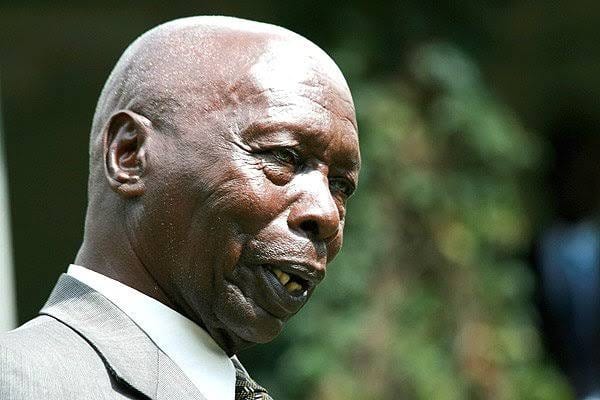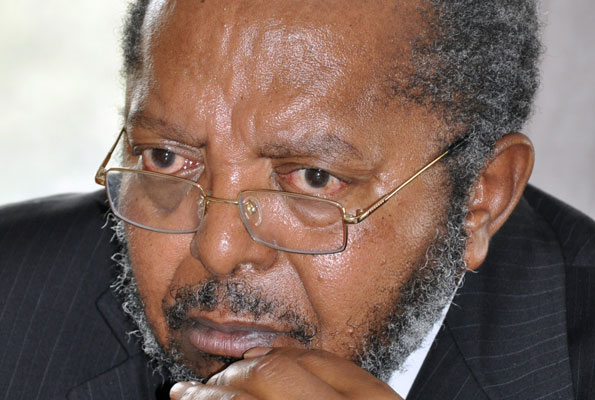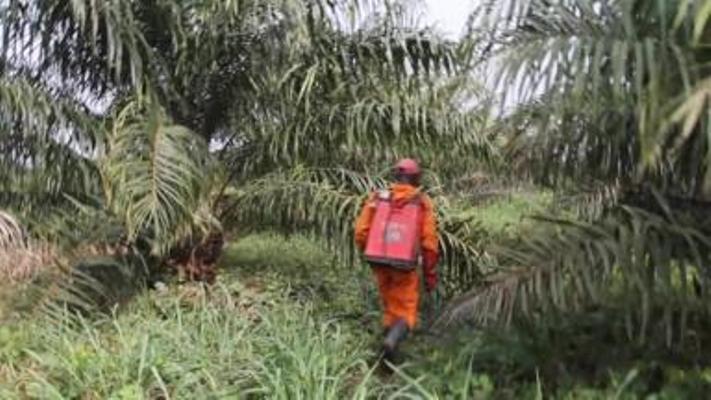Before the death of Jomo Kenyatta in 1978, then-Vice-President Daniel arap Moi (pictured) was nowhere in the league of propertied oligarchs – the powerful ultra-wealthy with expansive ranches, real estate and multimillion-shilling investments in bonds and shares.
While Kenyatta-era civil servants and select politicos had used their positions to amass wealth, Moi could not count as part of the elite league that had, ironically, fronted him to replace Joseph Murumbi as Kenyatta’s deputy, mainly because he was regarded as a weakling, a neophyte, and a passing cloud.
But by the time he left power on December 30, 2002, Moi was by far the richest person in the country, with his family controlling major sectors of the economy, with interests in publishing, education, real estate, hospitality, banking, agriculture, energy and transport.
Like Kamuzu Banda’s Press Corporation PLC, which owned a vast number of companies and virtually controlled various sectors of the economy, Moi built his commercial empire around Kabarak Limited, a company he had registered in May 1970, with its head office registered as LR 11482 Kabarak Farm.
It was a meteoric rise to riches with secret accounts in offshore tax havens, local and foreign banks.
Kabarak Limited was Moi’s first serious attempt at business, taking advantage of the Ndegwa Commission’s recommendations of 1970 that allowed civil servants and politicians to own and run businesses.
With the help of his former Permanent Secretary Kenneth Matiba – a man he would later detain and break – Moi built a small transport business and was contracted to distribute beer in the Rift Valley.
Matiba had in 1968 left the government to join East Africa Breweries Limited as a management trainee before becoming the General Manager in 1970.
Archival records indicate that the Transport Licensing Board (TLB) had allowed the company to operate in Nakuru, Eldoret, Kapenguria, Narok, Kericho, Kabarnet and Nyahururu. One of his close business allies then was the populist millionaire J.M. Kariuki, who was also distributing beer and other products in the region.
It was only after Moi became president that his transport company was granted a TLB licence in March 1979 to operate nationwide.
It is this business that grew into the modern-day Siginon Freight, whose original directors were Joshua Kulei, Gideon Moi and Henry Kiplagat.
Siginon Group is one of the largest logistics company in the region today.
JOMO’S INNER CIRCLE
In terms of property, Moi had started modestly after independence.
Archival records, once again, indicate that in 1964 Moi bought 2,344 acres in Kampi ya Moto for Sh60,000; a modest acquisition compared to the patterns at the time.
During the same year, for example, his Cabinet colleague Mbiyu Koinange purchased 645 acres in Limuru for Sh497,000, while another minister, Ngala Mwendwa, bought a 932-acre coffee farm in Kahawa worth Sh240,000.
The Kampi ya Moto farm was an addition to the 40 acres donated in 1957 by the African District Council in Kabimoi, Eldama Ravine, and where Rev Paul Barnett – his long-time friend and pioneer of Africa Inland Church – had built him a three-bedroomed house opened in 1959 by colonial governor Sir Evelyn Baring.
Moi was not a member of Jomo Kenyatta’s inner circle, which was mostly made up of Kiambu politicians, senior civil servants and businessmen, and most of whom did their business under the umbrella of Heri Limited, a company registered in 1974 by politicians and civil servants to do business with the government.
In his autobiography, former head of public service Jeremiah Kiereini, says: “About 20 senior civil servants and private investors got together and formed Heri Limited … by setting up this investment company, we were able to purchase shares without hesitation, because we were not involved in either the running of the businesses or the decisions made by the management.”
INDIAN CONNECTION
Moi was not part of Heri Limited, which had invested in DT Dobie, which was winning tenders to supply government and military vehicles. It had the Mercedes Benz and Nissan franchise.
Instead, he did business with the likes of Shantilal Nathabhai Patel, the founder of Solai Group and who had settled in the Rift Valley in the 1930s as a farmer.
It was this early dalliance with the Patels that would later mark Moi’s relationship with wealthy Indian families that would curry favour with him and help him build his business empire as they took control of government tenders.
It is thus not surprising that most of the companies that were associated with Moi had some Indian, Arab and Jewish connections – and some of these turned out to be the architects of the financial scandals that haunted the Nyayo regime.
Some of the big names that emerged during the Moi era as tenderpreneurs included Mombasa’s Rashid Sajad, Naushad Merali, Ketan Somaia, and Kamlesh Pattni.
In 1975, Moi, together with Nicholas Biwott, formed Lima Limited, which was importing combine harvesters and which would later be known as FMD East Africa.
LAND GRABBING
Some of company’s properties were grabbed from the public. Last year, the High Court directed that some Eldoret properties earmarked for a fire station, an Administration Police camp and district hospital be repossessed from Lima.
This was one of the cases that showed how some of Moi’s companies took advantage of his power to amass wealth.
His children would occasionally use State House letterheads as part of their correspondence with government officials as they sought favours.
For instance, in September 1988, Philip Moi used the letterhead to tell a Mombasa district officer that the family’s company, Concord Holdings, had been allocated a four-acre plot in Miritini and that he should “evict” the squatters living there. “We want to develop the plot,” he wrote.
In other cases, Moi would short-change his co-investors, as happened in the case of Stephen Mwangi Muriithi, the former deputy director of intelligence.
Moi and Muriithi conducted business with James Kanyotu, the head of the Special Branch, through Mokamu Limited.
ILLEGAL ALLOCATION
The trio, together with businessman Sadru Alibhai, the Golden Biscuits brand baron – and who in 1985 bought the Peugeot franchise in Kenya from Marshalls Universal PLC for Sh55 million – owned Fourways Investment, which then owned a prime building at the junction of Muindi Mbingu and Moktar Daddah streets, now known as Family Bank Towers.
Upon the detention of Muriithi after he fell out with Moi, it was alleged in court that Moi sold off and transferred some of the properties to himself.
In another case, he forcibly annexed 100 acres of land owned by his neighbour Ginger Bell.
It was alleged that after he became president, Moi coerced Bell to donate the land to Kabarak High School in 1980.
It was on this land that Moi built the school, and it was only after he left power that the Bell family decided to sue Moi over the mischief.
Moi lost the case as the Court of Appeal ordered him to compensate the family or vacate.
It was also during this period that Moi oversaw the division of several farms in Njoro and outlying areas, especially the Ngata and Kerma farms that were given to his political allies.
Archival documents indicate that Moi, together with his then-Lands assistant minister G.G. Kariuki and director of settlements P.K. Gota, were personally involved in the allocation of these farms.
Interestingly, the minister for Lands, Jackson Angaine, appears to have been left out of all this correspondence.
MAU PLUNDER
But it was taking of strategic businesses that became the hallmark of the Moi empire.
For instance, when UK-based Chloride Group wanted to sell its franchise in Kenya, it was Moi who took it up and named it Associated Batteries Manufacturers (ABM), with its core activities being collection of scrap batteries from customers, smelting, blending and refining lead for battery manufacture.
For many years, it had a monopoly, earning the Moi family a fortune.
Moi would also enter into the agriculture sector and was the first to hive huge chunks of Mau Forest, where he planted tea.
The land had ostensibly been given to him by the Narok County Council to stop people from encroaching on the forest.
It is on this land that Moi built his Kiptagich Tea Factory. He also owned the age-old Kaisugu Estate, which is managed by his son John Mark, and Theta Tea Estate in Nandi, managed by his daughter Jennifer.
ANCESTRAL LAND
The former Head of State also owned an expansive 17,000-acre ranch in Samburu known as either Eland Downs or Kabarak Farm, and which he donated to the African Wildlife Foundation started by US billionaire Russell E. Train.
After he retired, his lawyers spent nine years fighting claims from the Samburu community that this was their ancestral land and that Moi had no right to give it away. They lost the case.
Moi is also known to have used his position to expand his schools, and that is how he built Kabarak High School and Sacho High School – first as public schools before converting them to private schools.
Until the entry of Mwai Kibaki, both schools had teachers from the Teachers Service Commission.
More so, there is still controversy over how Moi got the Rift Valley Technical Institute that was built through harambee and which is now part of his empire.
In banking, the former president would run most of his affairs through Transnational Bank that was recently sold, and which never went through the scrutiny that faced other local banks.
Transnational was part of the banks that were used for dubious transactions during the Goldenberg scandal.
EMPIRE MANAGED BY TRUST
One of the Central Bank officials, the late Joseph Mumelo, told a judicial commission that he was warned against interfering with Transnational activities.
Others were Trade Bank, led by Ajay Shah, and Pan-African Bank owned by Mohammed Aslam, who was poisoned after giving crucial evidence to the commission inquiring into the February 1990 death of Dr Ouko.
Aslam was also the man who built Grand Regency Hotel before it was taken over by Kamlesh Pattni.
Through such commercial deeds, in which Moi was directly implicated in courts and in commissions of inquiry, he managed to build a powerful business portfolio and soon managed to eclipse or wash out any competitors.
What he could not buy, according to sources, he grabbed, and so did most of his political and commercial allies who found their way into boardrooms, parastatals and government, and where there was little difference between the state and the personal.
Moi’s empire has now been put into trusts after he was advised that this was the only way to avoid nationalisation by a future hostile regime.
But with divisions running within the family over the Moi estate, it might be a matter of time before some of his children, who feel that Gideon was Moi’s favourite, start to exercise control.





